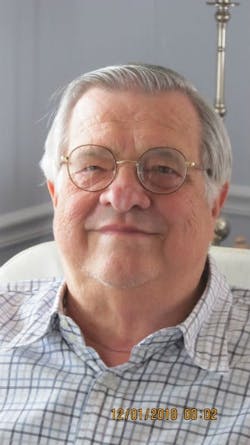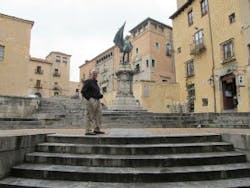2019 Control Process Automation Hall of Fame: Carlos A. Smith
Both were also enthusiastically nominated and selected by the existing members of our Process Automation Hall of Fame. And, as you’ll see, each presents an admirable example of how one person can influence and inspire others to strive and excel in the field.
A champion for the next generation
Our second and final 2019 inductee is Carlos A. Smith, Ph.D., professor emeritus, Chemical & Biomedical Engineering Dept., University of South Florida (USF). From when he was in high school, Smith knew he wanted to be a chemical engineer, “I had two years of chemistry in high school,” he says. “During the first year, I asked a professor and an uncle who was a chemist, ‘What can I do with chemistry?’ They both answered the same way: 'You can be a chemist or a chemical engineer.' Knowing that I disliked lab work, I asked about chemical engineering. I was told that Ch.E.’s work with processes, and at that instant I knew what I wanted to be.”
Smith graduated from USF with a B.S. in chemical engineering in 1967, and started working with Dow Chemical near Baton Rouge, La. “I was very lucky,” Smith says. “They assigned me to a group doing modeling and simulation (with analog computers) to study the design and control of new and existing processes. It was an outstanding experience. I liked it so much that I decided to continue on the path.”
Honors and awards
- 2007 Honorary professor, Universidad del Norte, Barranquilla, Colombia
- 2006-07 Chemical Engineering Professor of the Year, award given by AlChE student chapter
- 2005-06 Chemical Engineering Professor of the Year, award given by the AlChE student chapter
- Invited lecturer, Expo Control 2001 by ISA Mexico, June 2001
- University of South Florida Teaching Incentive Award, 1993/94. Award given for the first time to 8% of faculty at the university.
- Plenary speaker, "20th Anniversary of the College of Chemical Sciences" of Universidad La Salle, Mexico, August 1993
- 1991-92 Chemical Engineering Professor of the Year, award given by the AlChE student chapter
- 1991-92 Top Ten Professors University of South Florida
- 1987 University of South Florida Outstanding Undergraduate Teacher, award decided by a university faculty review board
- 1986-87 First Annual Outstanding Teacher College of Engineering, University of South Florida, award decided by College of Engineering faculty vote
- 1985-85 Professor of the Year—Co-op Placement, University of South Florida
- 1981-82 Professor of the Year Award—College of Engineering, decided by student vote
- 1981-82 Top Ten Professors, University of South Florida
- 1979-80 Professor of the Year Award—College of Engineering, decided by student vote
During 1972-76, Smith worked as an assistant professor at USF with summer jobs at Farmland Industries, Proctor & Gamble, Buckeye Cellulose and Monsanto, before landing an associate professor position at USF.
The work at Monsanto in Luling, La., took two summers and included designing computer programs for ammonia plant control loops, compressor/turbine efficiency calculations, evaluating a process condensate stripper, and dynamic simulation of level control in cooling towers. The second summer was devoted to using a computer for energy management, control schemes for natural gas distribution, startup and debottle-necking of a condensate stripper column, design of a control system for a triple-effect evaporation, and troubleshooting a cooling tower level control system.
As Smith climbed in academic stature to professor, department chairman, dean, and ultimately professor emeritus of the Chemical Engineering Dept. at USF, he continued to work with companies on problems, including computer simulation of chlorine and monomer plants and advanced control for hydrogen plants. But he says his major contribution to the field is teaching.
Students are his life’s work
Asked what he sees as his most important contribution to the field of process automation, Smith replies, “Without a doubt, my teaching experience—my ability to motivate students during their engineering education.
“I always tell the student that to do good process control one needs to know three things: (a) know the process, (b) know the process, and (c) know the process. This is exactly why I like process control. As a matter of fact, I like to be thought as a chemical engineer with a good process control background, as opposed to just a control engineer.”
However, it’s hard to bring in enough students. “In the past decade or so, many new fields such as biomedical, biotechnology, materials, etc. have opened, attracting students and making the competition for students very stiff," Smith says. “This is very good for the profession, and it is up to us faculty members (and industrial practitioners) to motivate students to automation.”
Smith adds this motivation is difficult because, “The process control course in chemical engineering is at the end of the curriculum (which may be the same case in mechanical and electrical engineering), and is considered by many students as a pain because of the amount of mathematics and lack of significance. And they're correct.”
This obstacle may be changing, “because several of us have realized it and are trying to change it,” Smith says. “For years, I've been cutting the amount of mathematics and relating what is left to practice. These days, I’m not using my textbook, but rather, writing and using a completely new one, and hopefully motivating the students toward automation.”
Retired since 2011, Carlos Smith still teaches, enjoys his five grandchildren, and travels to locations such as Spain, which he and his wife visited in 2016 on the occasion of their 50th wedding anniversary.
This isn't easy because most chemical engineering courses use the assumption of steady state in analyses and presentations. This generally results in using algebraic equations.“Suddenly, at the end of the curriculum, students get to the control course, and they're told that steady state doesn’t happen by itself, that process control is needed to force processes to work at the required steady state. Those changes don't occur instantaneously, so they must explain what happens as time changes, resulting in differential equations.”
Reactor design is another course where students use differential equations, but not as much as in process control. “For years, the process control course was mainly mathematics, tuning controllers and analysis of control loops,” Smith says. “There's very little control systems design, and that’s mainly plantwide control.”
Also, most chemical engineering departments are hiring faculty in the new research areas, but not in automation. This means that eventually, most of the instructors in the field will not have the experience, and probably not enough knowledge of practice in the field.
“In summary, it's up to us to motivate students and present them the importance and possibilities of automation,” Smith says. To this end, he suggests students’ first degree be as broad as possible, such as chemical, mechanical, electrical, etc. Then, if the student has the requirements, automation could be configured as an MS degree.
“The difficult part would be to motivate students to join the program,” Smith says. “Industry could play a most important part, for example, by offering internships that could be part of the program of study, and/or job offers after completing study. This could be a good topic of conversation, but we need industry and academia to be involved.”
Learn more about the other 2019 honoree, Nicholas Sands




